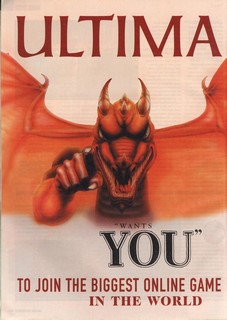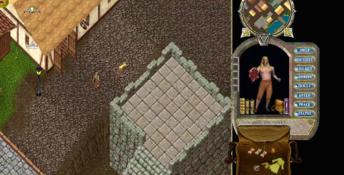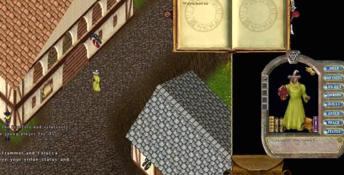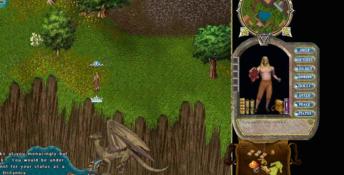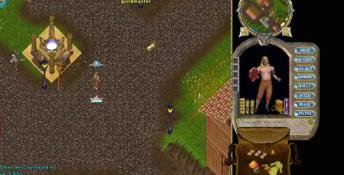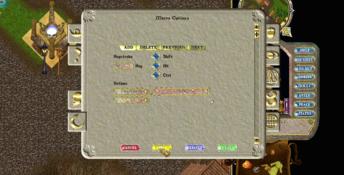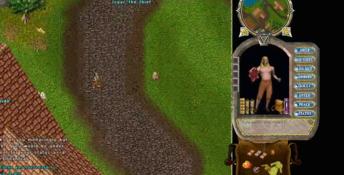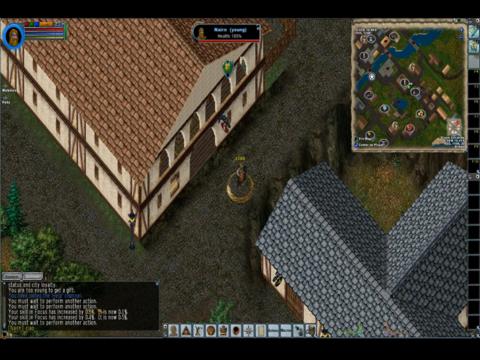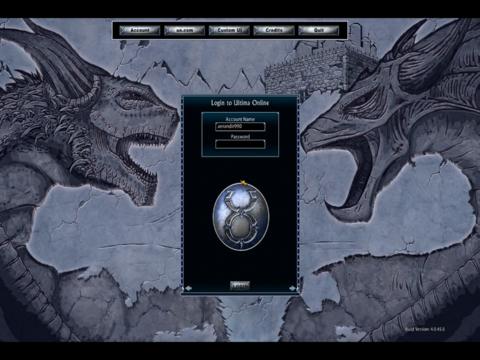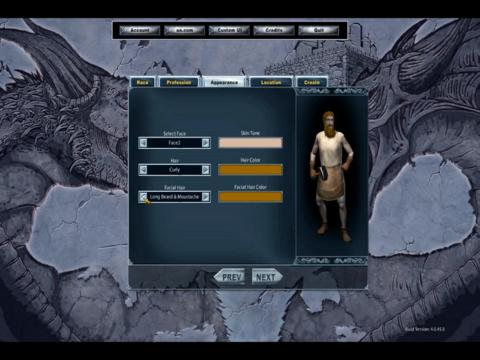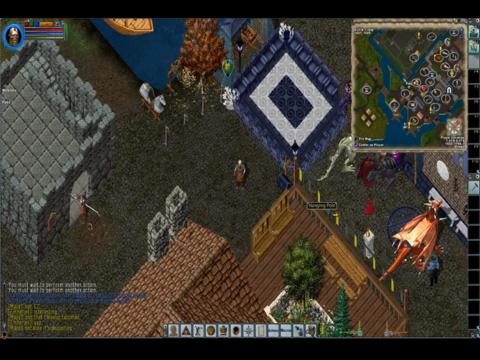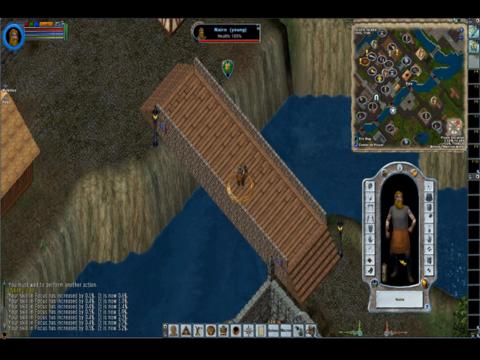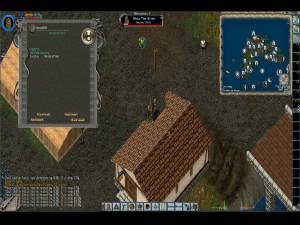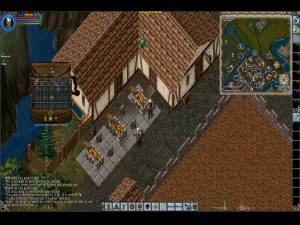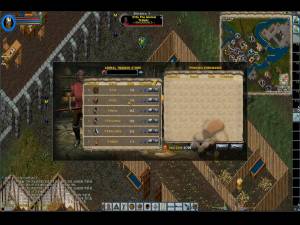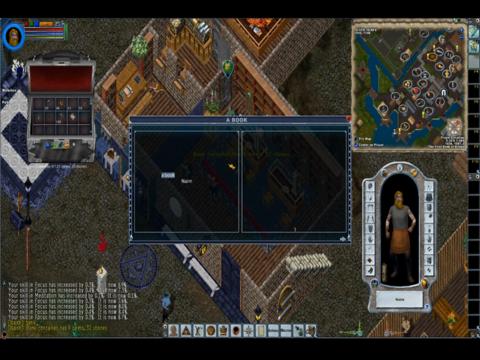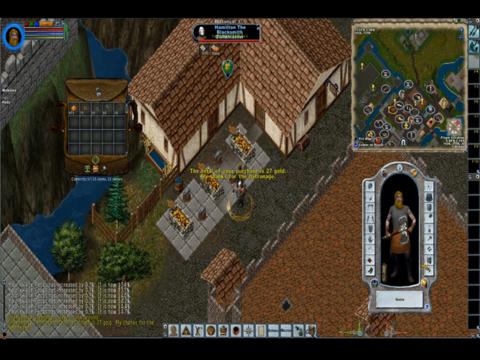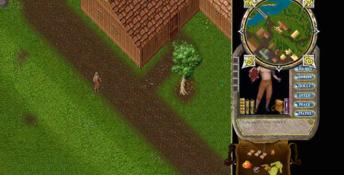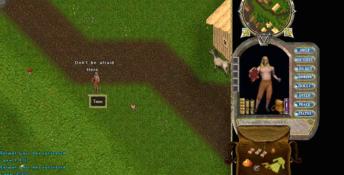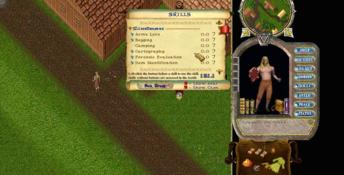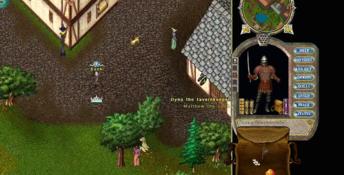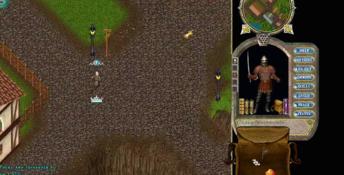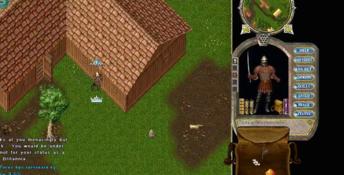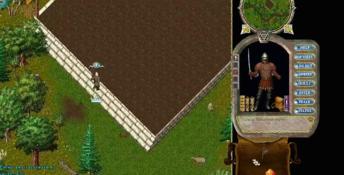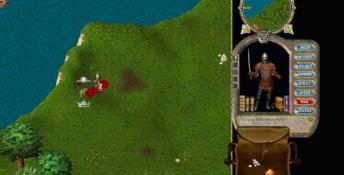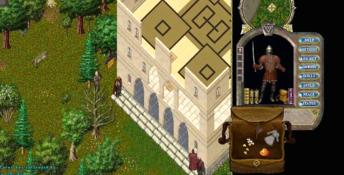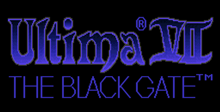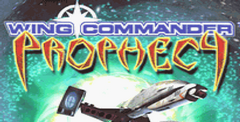Ultima Online
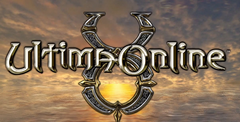
| a game by | Origin Systems |
| Platform: | PC |
| Editor Rating: | 8/10, based on 2 reviews, 3 reviews are shown |
| User Rating: | 7.3/10 - 3 votes |
| Rate this game: | |
| See also: | Download Strategy Games |
Believe it or not, there was a time when the term multiplayer was strictly related to one-on-one play over two PCs via a serial port, or a few people getting together over a local area network for a quick blast at Doom. While people were busy discovering the delights of shooting each other in the face in a Doom deathmatch over a LAN (mostly games journalists it has to be said), a company called Origin was busy working on something altogether more ambitious. The plan was to build a living, breathing world for players to live in virtually via the Internet.
The audacity Origin displayed in thinking it could actually create something that would be so good it would hold the interest of players over a period of years when most single-player games struggled to do it for more than a few days, was ever so slightly arrogant, not to mention wildly ambitious, but it still went for it all the same.
The man who conceived the idea and charged with making it all happen was Richard Garriott, creator of the Ultima series, one of the most engrossing and powerful role-playing series ever created. It was never going to be easy, but Garriot's reasoning behind the creation of Ultima Online shows he was confident right from the start: "Since I began writing games in the 70s RPGs have always emulated the social, paper games like Dungeons & Dragons but solo player games were all that the technologies of the day were capable of supporting in a high-quality way. As the Internet became more popular, we knew our time had come. So in the mid '90s we began creating Ultima Online in earnest".
Their time had come indeed, and against all the odds, they succeeded and created not only a game, but a whole new genre. This is how it happened...
Rule Britannia
Perhaps the most difficult challenge in creating a game of this kind is developing an actual world for people to live in. This was no problem for Garriott. he already had a world. The world was called Britannia, and anyone who had played the Ultima games was already familiar with its many towns and dungeons. Branding was firmly on his side, and so was one of the most convincing game environments you could possibly imagine. The question from there was, what the hell do you do with it? The Ultima games were rich in terms of story, but a game like this called for complex interaction with items, buildings and virtual people in the game world. It was to be no easy task, and Garriott was well aware of this, and let's be honest, anyone who was around at the end of beta for the 'official' release will readily testify that the game was in such a bad way when it was released, it's a wonder it ever survived its first year of existence. The gameworld was in place, NPC merchants were in their shops, the monsters were roaming Britannia, all the buildings and structures and towns you would expect from a virtual Britannia were present and correct, but the game itself was completely unplayable, with unstable code and nightmare lag combining to make Britannia more akin to hell than the multiplayer heaven players originally envisaged. Garriott is the first to admit to the early problems: "An MMP is much bigger and has inherently more complicated code than a single-player game. Thus the code base needed to be better engineered than previous efforts. It was a lesson we learned the hard way, by not doing it right and shipping an unstable game. Lag issues plagued us until we rewrote a good deal of the server code, and I don't think we kept people very happy during the transition. They even held a drunken, naked brawl in Lord British's castle as a protest."
Despite all its teething problems. Ultima Online struggled through its first year and developed into a game that would change the way people thought about interactive entertainment forever. For those of you who have never experienced Ultima Online first-hand and are wondering what all the fuss was about, the following is a guide to just some of the many innovations inspired by what will always be remembered as the true pioneer of the online revolution.
This Is Your World
The basic premise behind UO. as is the case with most RPG's, is to create a character and develop your skills while you explore a fantasy environment. UO went much further in the way it allowed you to advance your character, and in fact it even put single-player games to shame in the flexibility it gave you in this respect. You could use melee weapons and your melee skills developed accordingly, the same applied to schools of magic, but there were so many different areas in each category you could create a character that was entirely unique to you.
Combat: you like it? Good. If you don't, no problem. UO still has the most impressive trade skill development trees in any online RPG. bar none. In many ways, even Everquest is still embarrassingly shallow compared to UO in terms of character development and trade skill management and opportunities. Many people played this game as a blacksmith, or a tailor, or even a fisherman or explorer, without ever once entering into combat.
Housing: as you explored the world and accumulated gold through either killing or selling your wares, eventually you would accrue sufficient capital to buy your own house. This was one of the major selling points of UO. It was even possible to buy your own castle eventually if you played the game long enough and got enough gold together, and of course, you could decorate your house as you saw fit.
Player versus player conflicts: Ultima Online is still the only game that ever injected real fear into the people who played it, and it came in the form of the ever present player-killers who prowled dungeons and the outskirts of town looking for easy prey. It's impossible to describe the adrenaline rush you got when a known player killer entered your vicinity and you had to either run (which usually didn't get you very far) or defend yourself, knowing that if you lost the battle you would also lose your best weapons and armour to the player who killed you. Many of today's online titles have attempted to recreate the thrill of player versus player combat as experienced in UO. They have all failed.
All these things combined to produce a game experience like no other, and while most people have moved on now to 3D online RPGs and left UO behind, it remains the most complex and comprehensive online game on the market.
The Next Chapter
For all its innovations and revolutionary ideas. Ultima Online finally reached a point where it had to change in the name of commercialism. EverQuest arrived on the scene and offered a game environment where players could completely avoid player versus player combat if they chose the right server. A decision was made to implement safe continents in the Ultima Online gameworld, thus giving people a choice as to whether the many dangers and perils that normally lay waiting for them outside towns would pose a problem. For many people, this was the day Ultima Online died. For all the whining cry babies who complained about being killed and having their things taken from them in a dungeon (after walking straight into the damn thing unprepared, like the idiots they were) there was a whole group of people, a thriving community who were relishing the player versus player conflicts, which for them were an integral part of making the world believable. There were role-players on both sides of the argument - blatant player killers who terrorised the innocent, and knights in shining armour who fought them in the name of justice and protecting people as they I travelled from town I to town. It was a ' totally self-sufficient community where you had to keep your wits about you. or you paid the price. As time went by. more and more of l/O's content was geared towards non-PvR The I population count on the I non-PvP EverQuest servers compared to the PvP servers told its own story, but nobody bothered to tell EA that this was largely due to the fact that PvP in EverQuest was very badly implemented and the PvP was in no way integrated with the normal game to make it feel a necessary part of creating a believable environment. But the final nail in the coffin for UO was not the switch to player-friendly environments, it was the arrival of 3D. and along with it. the expectations of players went through the roof. EverQuest took full advantage of this.
The Game That Never Was
The game that many Ultima Online players waited patiently for was the fabled Ultima Online 2. For a long time it looked like it was going to become a reality and. of course, it was going to be 3D. This was the title that was going to replace UO as the premier online title, and bring new features and innovations to the genre, while at the same time retaining the original UO player base who could still play the original game on the old servers if they wanted to. It never happened. We don't know why, but Richard Garriott does: "After UO launched, we advised EA to build another property instead of moving forward with UO2. We felt UO2 would need to have all the features of UO1 and then some, and as UOI was growing it would be hard for UO2 to beat it. EA insisted we do UO2, but late in the project EA cancelled it as they saw UO2 was taking a long time and would cannibalise the UO1 player base... Just as we said."
Whether or not UO2 would have revived the UO franchise or killed it off completely we'll never know. However, we do know that irrespective of what comes after it, Ultima Online was the first truly original online RPG, and it still puts many of its followers to shame. The sad thing is, despite the obvious influence UO has had in creating and shaping what is now a flourishing genre, the UO copycats failed to learn from some of its most important features. Take a look at the EverQuest tradeskill system and baffling time-sinks that force players to spend forever completing what should be simple tasks, Anarchy Online's woeful PvP implementation, Dark Age of Camelot's insultingly simple approach to just about everything, Neocron's mish-mash of class skills which puts it in serious danger of disappearing up its own arse in a desperate attempt to balance the game, all of these titles have evolved from Ultima Online in some shape or form, and all of them still manage to get the simple things completely wrong. UO got everything right. That's what made it a classic, and that is how a genre was born.
Download Ultima Online

System requirements:
- PC compatible
- Operating systems: Windows 10/Windows 8/Windows 7/2000/Vista/WinXP
Game Reviews
Sharpen your swords: Origin's taking RPGs to the next level with Ultima Online, a revolutionary approach to multiplayer gaming that allows thousands of players to interact in a massive real-time RPG via the Internet. By hooking up to Origin's servers, gamers can join in an ongoing RPG adventure where they build their characters' skills, cut deals with other gamers or NPCs, amass wealth, create and run guilds, slay dragons, and otherwise embroil themselves in intrepid adventures. This dazzling fusion of online gaming and a classic RPG will surely score big with PC gamers.
A Day In The Life of Viper
A Day in the Life of One
Overview
Ultima Online is an online-only role-playing game of the dragons/magic/swords variety. The environment covers 200 million virtual square feet and contains about twelve towns and seven dungeons, with monsters, wildlife, and surprises in between. The population of this virtual world varies somewhere between two and three thousand individual human beings at any given time. Live people, just like you, playing from all over the world at once.
Some of them are struggling to survive in an increasingly hostile world. Others, who've been around a little longer, are economically stable and socially secure. And, of course, there's the usual assortment of wanton idiots, thugs, self-righteous player-killing 15-year-olds, etc.
Sound like a fantastic idea? It is. The reality, however, falls short of the mark. Origin is venturing into uncharted territory here, which is an easy thing to want but a difficult thing to make a success. Of course, there are those that love the game and those that hate it -- for a sampling of what daily life in Britannia is like from a first-hand perspective, see the "Day in the Life" pieces of two adventurers: Viper and One.
Gameplay
Very simple -- single and double clicks of both the right and left mouse buttons control most of your item handling, movement, combat, and so on. A click and slight drag brings up the health window of whomever you clicked on. Clicking to some things might seem like a bit more trouble than it should be -- using a skill, for instance, requires that you double click your character, click the skill button, then select the desired skill from the scrollable list -- a series of tasks that can be kind of a pain when you want to use a particular skill several times in a row. Fortunately, however, you can circumvent this by creating macros that allow direct access to any number of skills you like. A keystroke or two, and you're taming an animal, tracking, building an item -- whatever.
Comments On The Overall Design
The Cities
Well planned and implemented. If you live in an area where you regularly visit or pass through a handful of cities, you might recognize a few things. Yew, for example, is sparse, woodsy and without paved roads. It feels very much like what it is -- a somewhat isolated village on the far northwestern end of the main continent. The businesses tend to cater towards rangers and other outdoorsy types. Trinsic, on the other hand, has an upscale feel, with bright yellow brick streets, and a sedate, but active, economy. Britain is, of course, the bustling metropolis, with gray, paved roads, and ample opportunities for the burgeoning adventurer. It feels very alive and very old. It's also a good place to get your pocket picked.
The Economy is real. One of the best ways for a starter to make money is by making items, like sextants, clocks, bows, and so on, and selling them to NPC proprietors in town. The caveat is this: if there's a glut in the market, you might not find anyone to buy. If someone arrived a minute earlier and sold tons of the same item you were hoping to sell, then they won't buy from you. Things found, like furs, are practically a dime a dozen, and very difficult to unload. Meats are a little easier to hock, but still no great moneymaker. (They are a little easier to sell, and fetch a better price, when cooked, but cooking for profit is a basically fruitless endeavor unless you have a cooking skill of at least fifty percent. When you fail to cook, it burns to a crisp.) If you want the cash, then it's time to get to work.
Skills
It isn't enough in UO to simply choose a category like "fighting", or "magic". The former, for example, encompasses a wide variety of skills: "tactics", "swordplay", "parrying", and more. While "animal taming" is a good skill, if you're not up on your "animal lore", you might not know what to feed your pet, and it may eventually leave you or attack you, depending on it's temperament.
The jury is still out when it comes to the real value of this kind of system, however. In many cases, it still comes down to the numbers, it's just that there are more of them. (See the combat section immediately below.)
Something pleasantly unexpected about this game was the ability to form a party for a quest and have all the members be valuable, regardless of their stats. In your usual multi-player RPG, those with lower stats are dead weight -- people who can't go where the big guys and gals can go and be something more than a burden. In UO, it's actually feasible to enter a dungeon or fight monsters above ground (in a group), even if you're a lower level character. You can still get a few hacks in and back away, letting someone else take over for a minute while your recuperate. To be clear -- while I do say that it's feasible, I don't mean to imply that it's easy or without risk.
This, I think, gets very much to the heart of the game. Ultima Online is, more than anything else, a game about social interaction. While you can play as a loner, the moments that are the most satisfying involve other live people. Friends are valuable and revenge is personal. Getting killed by an Orc Captain or some such thing is frustrating, to be sure, but another live human being killing my little guy -- the guy I'd nurtured into a hero, trained and fed -- pisses me off!
Combat
The problem with combat skills, regardless of how complex and involved they may be, is that the activity of fighting still comes down to your character's statistics. The way it works is this: if you want to fight somebody or some thing, you enter combat mode and click on whomever you wish to attack. From then on out you are no longer involved in the activity unless you decide to disengage and run away. You'll be a voyeur to your own victory or defeat. This is something of a double-edged sword, I suppose, in that I appreciate this system when I'm sure to be victorious, but not when I lose.
Connection
Never perfect. Sometimes the lag was bearable, with only minor snaps and glitches. Other times, hover, it was enough to make me give up playing. Especially notable was a habit the server had of booting me off when I entered combat mode. Ultima is built with certain safeguards against those that would make mischief and then vanish into thin air, one of which is that if you log off without camping or staying at a lodge, your character stays plainly visible (read: killable and lootable) for quite some time afterward.
Graphics
The detail of character/creature images/animation and the surrounding environments aren't up to snuff with the finely drawn images provided by, say, Diablo. And while the Origin website strongly implies that the game will look better than the screenshots they have available, it doesn't. At least not to any measurable degree. The graphics, in their quality, are average at best.
There is, however, some variety available. Gender, hairstyle, and even skin tone are all customizable at the beginning of the game. And if you decide, for instance, that you'll traipse through town wearing nothing but a hot pink cloak and a g-string, then you can bloody well do just that. (Buck-naked is not an option, however.) In town you can have your clothes dyed or purchase more garments -- which provides numerous possibilities for creating your own special "look"
Audio
While there are some very nice touches (you can hear the approaching footsteps of other people, and your entrance into a city is accompanied by appropriately majestic music), I'd have liked a little more. In the cities, for instance, it would have been nice to hear a little urban ambiance. This would be especially true of certain places like the forge, in Britain, which is always crowded. As far as the general quality is concerned -- the music nice, but the sound effects are (to reuse a phrase) average at best. Animal and monster noises aren't very exciting, and don't do much to really enhance the gameplay.
System Requirements
The minimum system requirements for Ultima Online are: Pentium 133, 16 MB RAM, Windows 95, 1 MB PCI video card that supports DirectX set to 16-bit color, 16-bit sound card, 261 Megs hard drive space, 4x CD-ROM drive, Microsoft-compatible mouse, Slip/PPP or direct connect at 14.4k bps or better with 32-bit TCP/IP stack.
The preferred system for Ultima Online is: Pentium 166, 32 MB RAM, 2 MB PCI video card, 550 MB hard drive space, 8x CD-ROM drive, Slip/PPP or direct connect at 28.8k bps or better with 32-bit TCP/IP stack.
Valid credit card required for game installation. Internet connectivity required to play.
Documentation & Support
As of this writing, the website listed for tech support, http://www.origin.ea.com/tech/uo, doesn't provide anything but an error message. I would have expected them to have fixed this by now. Taking a stab at http://www.origin.ea.com/tech/ provided me with a default page and a dropdown box of games to choose from, but Ultima Online wasn't among them.
The literature that comes in the box is refreshingly sparse. Most of the things that aren't included -- NPC vocabularies, animal commands, and so on -- are easy to find out while playing the game. All you have to do is ask somebody.
Bottom Line
A fantastic, ambitious idea that that isn't quite ready for the prime time. Or that prime time isn't ready for. However diligently the Origin servers are maintained and their connections sped, the Internet simply may not be ready for this game. To say that lag can ruin the game is to belabor the point -- it can ruin most games on the market. But here, with the persistence of your character and the investment of time required to make playing fun, lag can b, and is, deadly.
Also, as is evidenced by the newsgroups and other forums, opinion is heavily divided over this title. Designing an environment that can keep up to 5,000 people happy at once is a formidable task, and I'm not sure that Origin has succeeded. At this point, Ultima Online rates a 73 for a great idea whose time has not yet come.
